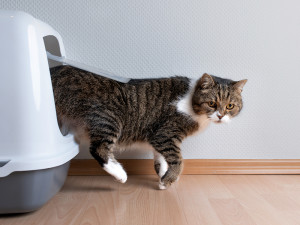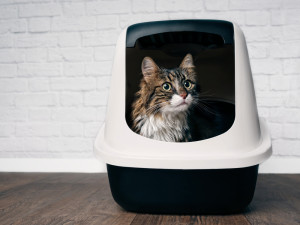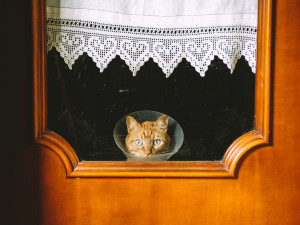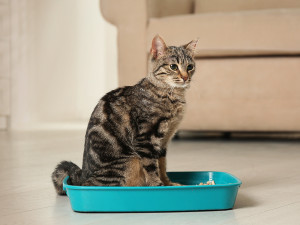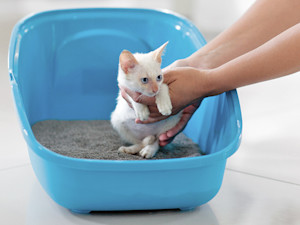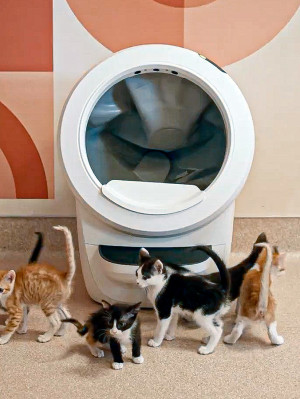Reasons Why Your Cat Is Peeing Everywhere (Besides the Litter Box)
It's frustrating, but it's also fixable.
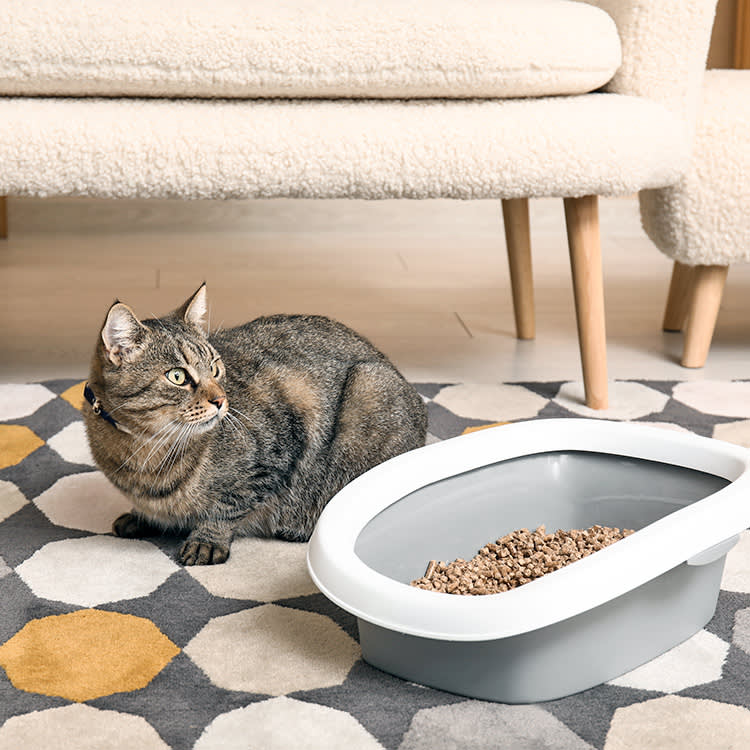
Share Article
In This Article:
Medical Reasons: Cat Peeing Everywhere Behavioral Reasons: Cat Peeing Everywhere Other Reasons: Cat Urinating Everywhere How to Fix the Issue of Your Cat Peeing Everywhere
The most common reason cats are surrendered to shelters? Peeing outside the litter box. Unfortunately, inappropriate elimination is all too common among cats. Meanwhile, most pet parents are unaware of the medical, behavioral, and environmental reasons why they’re doing this — or of the ways to stop this problem.
The first step is finding the cause of this issue, then addressing it with the proper treatment, with help from your vet. Here’s a detailed overview of what those initial factors could be.
Main takeaways
Cats peeing outside the litter box is a common problem.
Medical reasons they do this include infections, bladder stones, idiopathic cystitis, kidney disease, liver disease, hyperthyroidism, and diabetes.
Behavioral reasons include stress, anxiety, change, and territorial reasons.
Other reasons tend to involve hygiene, the actual litter box, or physical changes in your cat, such as arthritis.
Fixing the cause will remedy this problem.
Medical reasons your cat is peeing everywhere
You owe it to your cat to explore first the possibility that they’re peeing outside their litter box due to a medical reason. This can include infections, bladder stones, idiopathic cystitis (which includes feline urologic syndrome, feline lower urinary tract disease, and feline interstitial cystitis), and kidney disease. It can also be due to other metabolic diseases that cause excessive urination, such as liver disease, hyperthyroidism, and diabetes. Below is a look at each of these medical issues.

Urinary tract infection
Potentially the easiest issue to fix, this is also the least likely cause of peeing outside the box. But it’s often blamed, and antibiotics are dispensed even when there’s no real justification. To determine if your cat actually h as a urinary tract infection (UTI), your veterinarian will perform a complete physical exam and obtain a urine sample for analysis. If bacteria are seen, an antibiotic will be dispensed. They may take a culture and perform a sensitivity test to ensure the antibiotic is the right one.
Bladder stones
Hardened clumps of minerals that form in the bladder can be quite painful and accompanied by crystals and infection. If your vet suspects bladder stones, X-rays and possibly an ultrasound will be recommended. Small stones may be dissolved with a particular diet. Larger stones will need to be removed surgically.
Idiopathic cystitis
The most common urinary disorder in young to middle-aged cats is this inflammatory condition, not an infection. While the cause is not known, stress, environmental factors, and diet are suspected to be major factors. Idiopathic cystitis is characterized by blood in the urine, straining to urinate, discomfort, frequent urination, urinating outside the litter box, and excessive grooming of the genital area. Treatment involves reducing stress, enriching the environment, encouraging more water consumption — and possibly prescribing pain medication, anti-inflammatory medication, or antidepressants.
Kidney disease
Kidney disease can occur in cats at any age, although most older cats eventually develop it. Cats with kidney disease drink and urinate excessively, and they are also more prone to urinary tract infections. The need to urinate more may lead to peeing outside the box. Other diseases that cause increased urination, such as hyperthyroidism, liver disease, and diabetes, may also lead to inappropriate elimination.
Behavioral reasons your cat is peeing everywhere
A large number of cats who are peeing outside the box have no medical reason to do this. The assumption will then be that this is a behavioral problem.
Cats are very sensitive creatures. While they are affectionate, warm, soft, cuddly, and beautiful — just about anything can upset them. They are very prone to stress and anxiety, and absolutely hate change in their environment.
It’s unknown exactly why, but when they’re stressed or scared, they often express this by peeing outside their litter box. Some people assume cats do this because they’re angry, jealous, or spiteful, but that couldn’t be further from the truth — they don’t have those emotions. So, let’s look more closely at what is really going on.
Territorial marking
It is perfectly natural for a cat to want to mark their territory. They may feel a need to define and defend their space. This is most common in unneutered males but can also occur in neutered males and females. Changes in their routine, environment, or the addition of a new pet or person are triggers that can cause marking. The best way to combat the behavior is to minimize the stress and ensure they feel secure.
Stress and anxiety
As mentioned, cats are easily stressed. For instance, being put into a carrier, riding in a car, and visiting the vet or groomer can be downright traumatizing to them. A cat is happiest when they’re home, surrounded by familiar territory, and following the same routine day after day. Changes of any kind can create significant anxiety, which can lead to peeing outside the box, either from the stress itself or from idiopathic cystitis caused by stress.
Changes in routine or environment
Your cat likes their familiar home. If you move, that is very frightening to your cat. Another unpleasant change for them arrived around the pandemic: A lot of people suddenly began to work from home (and still do). Although that seems like something that would please your pet, it’s a significant change — and cats don’t like change. Conversely, maybe your cat got used to your being at home, and now you’ve returned to workopens in new tab. That can be even more upsetting to them. If your cat is peeing outside the box, consider everything that has changed in their life or environment.
Other reasons your cat is urinating everywhere
A few other factors can lead your cat to avoid litter boxes. These tend to involve hygiene, the litter box itself, or physical changes in your cat.
Old urine smells
Few things smell as bad as cat urine, especially if you have an unneutered male — getting the odor out of rugs and floors is next to impossible. You can scrub until you’re blue and can’t smell anything, but your cat will still smell the urine and be attracted back to that spot. The urine odor can even seep beneath your floor into the subfloor. Sometimes, the only way to remove the odor from your house is to clean both the surface floor and the subflooring.
Inappropriate litter box type or location
The type of litter box a cat prefers can vary widely. Most studies show that cats like large, uncovered boxes and litter that clumps. Both points make sense: Cats need room to move around and don’t like something over their heads restricting them, and they like their litter clean, which clumping tends to facilitate.
Additionally, most cats prefer a quiet, out-of-the-way location for the box, and don’t like scented litter. Feline behaviorists recommend having one more litter box than your number of cats. They should not be lined up in your basement, but located on each level of your home, separate from each other and away from food and water.
Dirty litter box
Those gorgeous creatures who work so hard to keep themselves clean want their litter box clean as well. Each litter box should be scooped twice daily.
Aging
As cats grow older, almost all of them develop arthritis. This can happen as early as middle age, typically around age seven to 10. By age 12, more than 90 percent of cats will show radiographic signs of degenerative joint disease. This can make it painful for them to step over the sides of the litter box and find another spot to relieve themselves.
Dirty environment
A dirty environment is a common reason cats stop using their litter boxes. As noted, cats don’t like unpleasant odors or soiled areas. They need a clean litter box, scooped twice daily, with the litter completely changed once a week. They also want the box to be scrubbed and the area around it neat. Be careful in multi-cat households, as cats dislike sharing litter boxes.
Dirty paws
It is not uncommon for litter to get stuck to a cat’s paws. This can disturb them and lead to an aversion to using the litter box. Check your cat’s paws frequently and clean them as necessary.
How to fix the issue of your cat peeing everywhere
By telling you what cats don’t like, you have some answers about why they may shun their litter box. Now it’s time to take steps to try to curb this action.
Visit the vet
If your cat is peeing outside the litter box, the first step is to make an appointment with the vet. Medical causes of inappropriate elimination must be ruled out before you assume it’s behavioral.
Try behavioral modification
This can be an effective way to stop your cat from peeing outside the litter box. Identify and address any underlying causes, such as stress or an aversion to the litter box setup. Positive reinforcement is key. Reward good behavior. Avoid punishment. Clean soiled areas with an enzymatic cleaner. Consider confining your cat to a small area with the litter box, then expanding their space as they improve. Remain patient and consistent.
Adjust the litter box
Ensure you have enough litter boxes and that they are in the right places. Remove lids and liners, and avoid automatic litter boxes. Cut out one side of the box, if your cat is arthritic and has trouble entering it. Don’t use scented litter. Also, experiment, if necessary, to find a litter your cat does like.
Implement preventative measures
Stress reduction is a significant preventative measure, as is a stable routine. Offer enrichment toys and climbing spaces, and create safe zones for your cat to retreat to when overwhelmed. Address any signs of medical issues, such as urinary tract infections or bladder problems, with prompt veterinary care, because health concerns are a common trigger for inappropriate urination. Follow all the previous tips about maintaining a clean litter box and environment.
FAQs
Which scents will keep cats from peeing where they shouldn’t?
Citrus scents and essential oils such as lavender, eucalyptus, and peppermint may help deter cats from peeing where they shouldn’t. However, essential oils must be diluted and used cautiously to prevent toxicity. Try using these scents by lightly misting the diluted oils where your cat has urinated. You can also place citrus peels or sachets of dried lavender in these areas. Keep in mind that this is a temporary fix, and it is still important to address the root causes of their behavior.
How do you discipline a cat for peeing outside the litter box?
Disciplining a cat for peeing outside their litter box will not yield any helpful results, because negative punishment will only make a cat more anxious. Instead, use positive reinforcement, and work through the steps presented, above, in this article.
References
Cooper, Leslie Larson. “Feline Inappropriate Elimination.” Veterinary Clinics of North America: Small Animal Practice, vol. 27, no. 3, May 1997, pp. 569–600, https://doi.org/10.1016/s0195-5616(97)50055-6opens in new tab. Accessed 31 Mar. 2020.
Horwitz, Debra F. “Behavioral and Environmental Factors Associated with Elimination Behavior Problems in Cats: A Retrospective Study.” Applied Animal Behaviour Science, vol. 52, no. 1-2, Mar. 1997, pp. 129–137, https://doi.org/10.1016/s0168-1591(96)01073-8opens in new tab.

Marianne Eloise
Marianne Eloise’s work has appeared in The New York Times, The Guardian, The Cut, Vulture, and more. She is also the author of an essay collection Obsessive, Intrusive, Magical Thinkingopens in new tab. She has been going on adventures with her dog Bowie since she was 17.
Related articles
![cat with cone after vet visit]()
How Often Should You Take Your Cat to the Vet?
Get thy cat to a vet, even if it’s a struggle to get them out the door.
![Cat sitting in a teal litter box]()
How to Train a Cat to Use a Litter Box
If you do nothing else, teach your cat to poop in their litter box (not your shoe).
![Person holding small kitten inside litter box.]()
How to Litter-Train a Kitten: Tips and Advice
It’s definitely a process.
Should You Train Your Cat to Use the Toilet?
This is not Meet the Parents.
![Kittens and the Litter Robot kitty litter box.]()
The Best Litter Boxes for Kittens in 2025
Help your little one learn the ropes.

